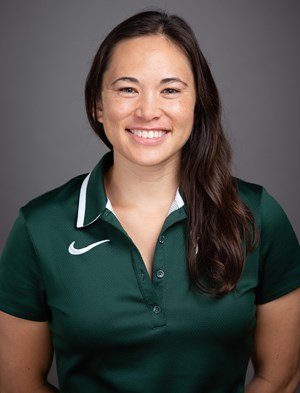RDN Spotlight: Rayanne Nguyen MS, RD, CSSD, CSOWM, LDN
What is your ethnicity/race? Did your family have any customs related to food? Please describe.
I identify as Asian American. Food has always been an important part of my life. I have so many memories around the table with my family.
Where/when did you go to undergrad/dietetic internship/grad school?
I completed my DPD program and competed as part of the swimming and diving team at Fresno State (CA). I moved 2000 miles to complete my MS-DI program at Northern Illinois University.
Why did you decide to choose nutrition and dietetics as a career?
As a collegiate swimmer, I realized very quickly how much nutrition made a difference in my athletic and academic career. As a freshman, I had no idea what I was doing! I was fortunate to meet our school's consultant sports dietitian and she was instrumental in helping me understand the value of nutrition. Once I met with her, I knew I wanted the type of job she had. At the time, however, sports dietitians in college athletic departments weren't really a thing - the NCAA rules around food were different, the field was in its infancy. I was told I could never get a full-time job in sports nutrition. But those comments didn't deter me and here we are!
What do you do now as an RDN and what does a typical day/week look like for you?
A typical day in the life of a sports dietitian doesn't exist because no two days are the same! That's part of what makes it so fun. Generally speaking though, my week consists of: 1) consults with student-athletes (whether performance fueling related, such as pre/post workout fueling or gameday strategies, hydration, GI issues, food allergies, eating disorders, supplements, or otherwise); 2) team/group presentations, grocery store tours, cooking classes, or education; 3) food service responsibilities (fueling station, menu planning, travel arrangements); and 4) leading and mentoring nutrition students and dietetic interns. I also answer tons of emails, make appearances at practices/competitions, receive product deliveries, stay up to date on the latest research, and collaborate with other members of the sports medicine and performance teams.
What is/was the biggest challenge for you in becoming a dietitian and how did you overcome that challenge? This can be related to being an RD of color or not just any challenge?
There are a lot of barriers to becoming a sports dietitian. The field is young, and at the collegiate/professional level, organizations are just beginning to realize the potential of a sports dietitian. This can mean limited resources or staffing in many situations. You are also expected to have a variety of (often un- or under-paid) experiences that can be challenging to achieve depending on your location, background, socioeconomic status, and schedule prior to becoming a sports dietitian. Being a student-athlete while studying dietetics was also very challenging. I had to do a lot of extra activities during summer or the offseason to try and make myself a competitive dietetic intern candidate.
Have you had any mentors in your career if yes how have those mentors affected your career/life?
Yes, mentorship is very important to me. I had a great mentor when I first became a dietitian who helped me see myself as a competent, qualified dietitian even when I felt inadequate. I've also had other mentors for seasons when I was pivoting and they provided their invaluable wisdom. As dietitians, it's important that we seek growth, no matter how many years we've been practicing. I've found supervision and case consult groups very helpful in my current season. And I'm thankful for the opportunity to mentor up-and-coming sports dietitians over the last few years!
Why do you think diversifying this field is important?
In sports dietetics, the athlete populations we serve are often more diverse than the sports dietitians providing care. This makes it more difficult for our athletes to receive appropriate care if they aren't able to relate to their nutrition practitioner or feel that their practitioner can't relate to their lived experiences. We need more perspectives in sports dietetics and more sports dietitians talking about cultural foods for performance.
What is a piece of advice you would give a student of color interested in entering the field of dietetics?
Find a mentor(s). Utilize your resources and network as much as possible. Fiercely protect your boundaries. Seek first to understand, not to be understood.

